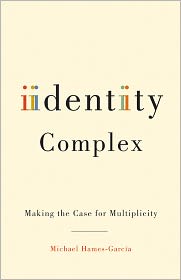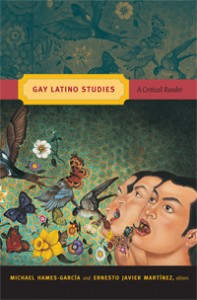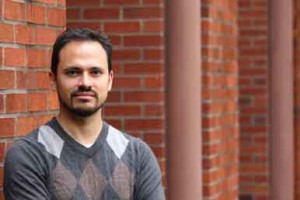Editor’s Note: This is a full-length version of the interview that appears in shorter form in the 2014 CSWS Annual Review.
By Jenée Wilde, PhD Candidate, UO Department of English (Folklore)
Michael Hames-García is a professor in the Department of Ethnic Studies at University of Oregon. Originally from Portland, he earned his PhD in English from Cornell University and taught on the East Coast before returning to his home state to direct Ethnic Studies at the University of Oregon for five years. He also directed UO’s Center for Race, Ethnicity, and Sexuality Studies for six years, and he has been involved for more than a decade with the Future of Minority Studies Project, a national research initiative funded by the Mellon Foundation. Among his honors, Hames-García was the recipient the 2011 Martin Luther King, Jr. Award for promoting cultural diversity and racial justice at the University of Oregon. Author of Fugitive Thought: Prison Movements, Race, and the Meaning of Justice (2004) and Identity Complex: Making the Case for Multiplicity (2011), his research examines the complex interplay of gender, race, sexuality, and colonial legacies in U.S. society and the interrelatedness of different forms of social identity. His current research is focused on gender, race, and sexuality in literary production about gay men during the period between World War II and the Stonewall Rebellion.
JW: In forty years, you are the first male director of the Center for the Study of Women in Society. Why did you want to lead a women’s research center?
 MHG: That’s an interesting question, and I’ve heard versions of the question already. One of the things I think is interesting is that I actually suspect that it will be more impactful in the long run—or I hope it will be more impactful in the long run—that I’m the first director of color for CSWS in forty years, rather than the first male, or in addition to being the first male director of CSWS. I wanted to direct CSWS not specifically because it’s a women’s research center, but because I’m passionate about research. I’m passionate about feminist and anti-racist and anti-homophobic research, and CSWS is the place to make an impact on that research and that scholarship, particularly at the University of Oregon. It is an amazing opportunity to really influence the course of feminist scholarship on the campus but also beyond the campus, and I couldn’t pass it up.
MHG: That’s an interesting question, and I’ve heard versions of the question already. One of the things I think is interesting is that I actually suspect that it will be more impactful in the long run—or I hope it will be more impactful in the long run—that I’m the first director of color for CSWS in forty years, rather than the first male, or in addition to being the first male director of CSWS. I wanted to direct CSWS not specifically because it’s a women’s research center, but because I’m passionate about research. I’m passionate about feminist and anti-racist and anti-homophobic research, and CSWS is the place to make an impact on that research and that scholarship, particularly at the University of Oregon. It is an amazing opportunity to really influence the course of feminist scholarship on the campus but also beyond the campus, and I couldn’t pass it up.
JW: What other kinds of collaborative research and leadership processes have you been a part of?
MHG: I was on the National Coordinating Committee for the Future of Minority Studies [FMS] research project. It was a consortium of faculty and graduate students across the nation who were doing scholarship on race, gender, sexuality, and colonialism, and really trying to make an impact on the state of intersectional feminist scholarship in the humanities and social sciences. We ran, among other things, a summer institute for six years at Cornell University and Stanford University to bring in advanced graduate students and junior faculty into a seminar to work intensively with senior scholars. We also organized a number of national conferences over the course of a little over a decade.
JW: Have you seen any outcomes from that?
MHG: Yes, a lot of the scholars that came though the FMS summer institutes, colloquia, and conferences have gone on to get positions and become tenured. It’s really nice to see all these alums of FMS populating women’s studies and ethnic studies departments across the country.
 JW: You must realize that some CSWS affiliates are nervous about a man taking over as director. What would you say to those who fear that the concerns of women and girls will get lost, or take a back seat, to your own areas of interest?
JW: You must realize that some CSWS affiliates are nervous about a man taking over as director. What would you say to those who fear that the concerns of women and girls will get lost, or take a back seat, to your own areas of interest?
MHG: I think it’s a legitimate concern. I think that it’s a concern that I would have about a man taking a directorship of a center for the study of women in society. That said, what I would say in response is that my own interests are, in fact, the study of women in society, the study of women and girls, as well as the contexts for that study—namely, the study of gender and sexuality. And I think that my desire to be involved with CSWS is largely a desire to be involved with that scholarship and to promote the scholarship on women, gender, and sexuality at the University of Oregon. I’m not sure what else to say but that is my scholarship.
JW: How have feminist mentors influenced your development as a scholar?
MHG: My development as a scholar has been almost entirely under the influence of feminist mentors. They’ve influenced it profoundly—the way I think, the questions that I ask, how I define knowledge in a research topic. All of that is influenced by feminism and feminist mentors and feminist scholarship.
JW: Can you give me an example?
 MHG: Going back to the beginning with my dissertation, I did that at a time when very little of the scholarship being done in critical prison studies paid any attention to gender. And it never really occurred to me as a possibility for myself to do a project on prisoners that didn’t take gender and the construction of gender as a central framework, rather than gender as some kind of variable or as a kind of essentialized or natural category. There’s a lot of research, particularly on men in prison, that takes masculinity as this thing without questioning it at all as a social construction.
MHG: Going back to the beginning with my dissertation, I did that at a time when very little of the scholarship being done in critical prison studies paid any attention to gender. And it never really occurred to me as a possibility for myself to do a project on prisoners that didn’t take gender and the construction of gender as a central framework, rather than gender as some kind of variable or as a kind of essentialized or natural category. There’s a lot of research, particularly on men in prison, that takes masculinity as this thing without questioning it at all as a social construction.
JW: How do you see yourself as a feminist leader and mentor?
MHG: I’ve always tried to be the kind of mentor that my best mentors were. I don’t know if I think of it explicitly as a feminist style of mentorship, but since those mentors were feminist, that’s probably there. I certainty, as a leader—seems weird to call myself a leader, but I guess I’ve had leadership positions—I strive for building consensus. When we were departmentalizing ethnic studies, one of the things that we were explicit about was to specify that our department did not run on Robert’s Rules but on consensus. So I think that while it can be a frustrating process, and it can be a slow process, and it’s not necessarily always a feminist process, either, I do think that consensus is a good process that lends itself to feminist ideals more so than other kinds of decision-making practices. And it’s almost always worth it. It’s amazing to me how often I’m more happy with the results of a consensus process than with the initial proposal I developed for group discussion. Other people are very smart, and their input nearly always improves an idea. Again, I don’t know if that’s a feminist style of leadership per se, but it’s certainly something I strive to make compatible with my feminism.
JW: What other leadership roles have you held on campus, and how were they related to your decision to lead CSWS?
MHG: In addition to directing the Department of Ethnic Studies, I also directed a research center, the Center for Race, Ethnicity, and Sexuality Studies [CRESS] at the University of Oregon, which was around for five or six years. I think that part of what I wanted to do with CRESS was expand the kind of work that CSWS was already doing, but specifically offering opportunities that CSWS at that time wasn’t able to offer. So we did a lot of works in progress among faculty and graduate students with other faculty commenting, and we also did a number of publishing workshops with press editors. I understand that, since then, both CLLAS [Center for Latino/a and Latin American Studies] and CSWS have taken up the model of the publishing workshops, which is great. I remember having conversations both with [past CSWS directors] Sandi [Morgan] and Carol [Stabile] at different points about folding the activities of CRESS into CSWS. Those never quite culminated, but once I was no longer able to sustain CRESS because of the lack of funding, I had more conversations with Carol about trying to bring some of those activities more into the CSWS umbrella.
JW: Do you feel like directing CSWS follows in the footsteps of what you’ve done already with the Future of Minority Studies and CRESS?
 MHG: I think so. I think it’s a new stage for me, certainly a new kind of endeavor. FMS was multi-institution but with a funding base at Cornell University, provided through the Mellon Foundation, and also with a large national coordinating team, so that project had particular challenges to it given its extra-institutional structure. CRESS, being an unfunded research center, had other challenges, but I think I was able to make a good impact on the campus with that center despite those challenges. I’m really hoping that CSWS, with its endowment, with its long-established reputation and its great set of affiliate scholars, will be able to be an excellent vehicle for making change.
MHG: I think so. I think it’s a new stage for me, certainly a new kind of endeavor. FMS was multi-institution but with a funding base at Cornell University, provided through the Mellon Foundation, and also with a large national coordinating team, so that project had particular challenges to it given its extra-institutional structure. CRESS, being an unfunded research center, had other challenges, but I think I was able to make a good impact on the campus with that center despite those challenges. I’m really hoping that CSWS, with its endowment, with its long-established reputation and its great set of affiliate scholars, will be able to be an excellent vehicle for making change.
JW: How have you been involved with CSWS, and how has that involvement supported your development as a scholar?
MHG: It’s always been for me a place of intellectual community on campus, a place where exciting things are happening and where exciting work is being generated. I was on the board of CSWS shortly after I arrived at the University of Oregon in the late 2000s. I’ve been involved tangentially with a couple of RIGs but not centrally. I applied for some CSWS travel grants, but I haven’t had any major funding from CSWS for my research. It definitely has been a place that has sustained me as an intellectual just through its presence and its events and the kinds of projects that it has developed and the kinds of people that it attracts.
JW: Can you give me one example?
MHG: When Sandi Morgan was director of CSWS, Lamia Karim and Sangita Gopal organized a conference on Empire. It was my second year here, and they brought in an amazing entourage of feminist scholars from around the world with amazing perspectives on women and society that I had not encountered before. It was a really amazing, amazing weekend. That was just early on. The queer studies RIG, I think in its first iteration, organized a writing retreat on the coast where I did a lot of the writing of my last chapter of my second book.
 JW: What are your goals as director?
JW: What are your goals as director?
MHG: My goals as director are to continue the work that has been done to grow the endowment, to expand CSWS’s capacity for supported research on campus—particularly expanding the capacity for supporting graduate student research and undergraduate research. I’m really hoping to build CSWS’s profile off campus in the Oregon community. We already do great work with that with the Road Scholars, so I’m hoping to expand that as well as to expand the relationship between CSWS and non-profit organizations in Oregon that focus on women, as well, one of those being Sponsors, Inc.—an organization in Lane County that works to meet the needs of men and women reentering society after their release from prison, whose board I have recently joined. As far as CSWS’s programming goes, I’ve been in conversation with the advisory board about structuring some of the activities around annual themes to give a slightly higher profile to certain activities that the center does and to organize conversations campus-wide around those topics.
JW: What themes are you considering?
MHG: They aren’t finalized yet, but certainly we’re interested—particularly in light of recent events on campus—in questions of violence, including structural violence and sexual violence. Also, there’s been some conversation around ideas of colonialism and post-coloniality in relation to gender, as well as identity and performance.
JW: Anything else you would like to tell our interested audience?
MHG: I’m very excited about the challenges and opportunities that CSWS poses. I think that it’s amazing to step into a legacy of forty years. I feel the weight of the work that people have done in those decades to build this center, and I feel as someone who grew up in Oregon, and someone who’s learned from feminist scholars my whole life, and someone who is committed to the University of Oregon, I feel a responsibility to that legacy—to build on it, to improve on it, and to steward it for generations to come.


